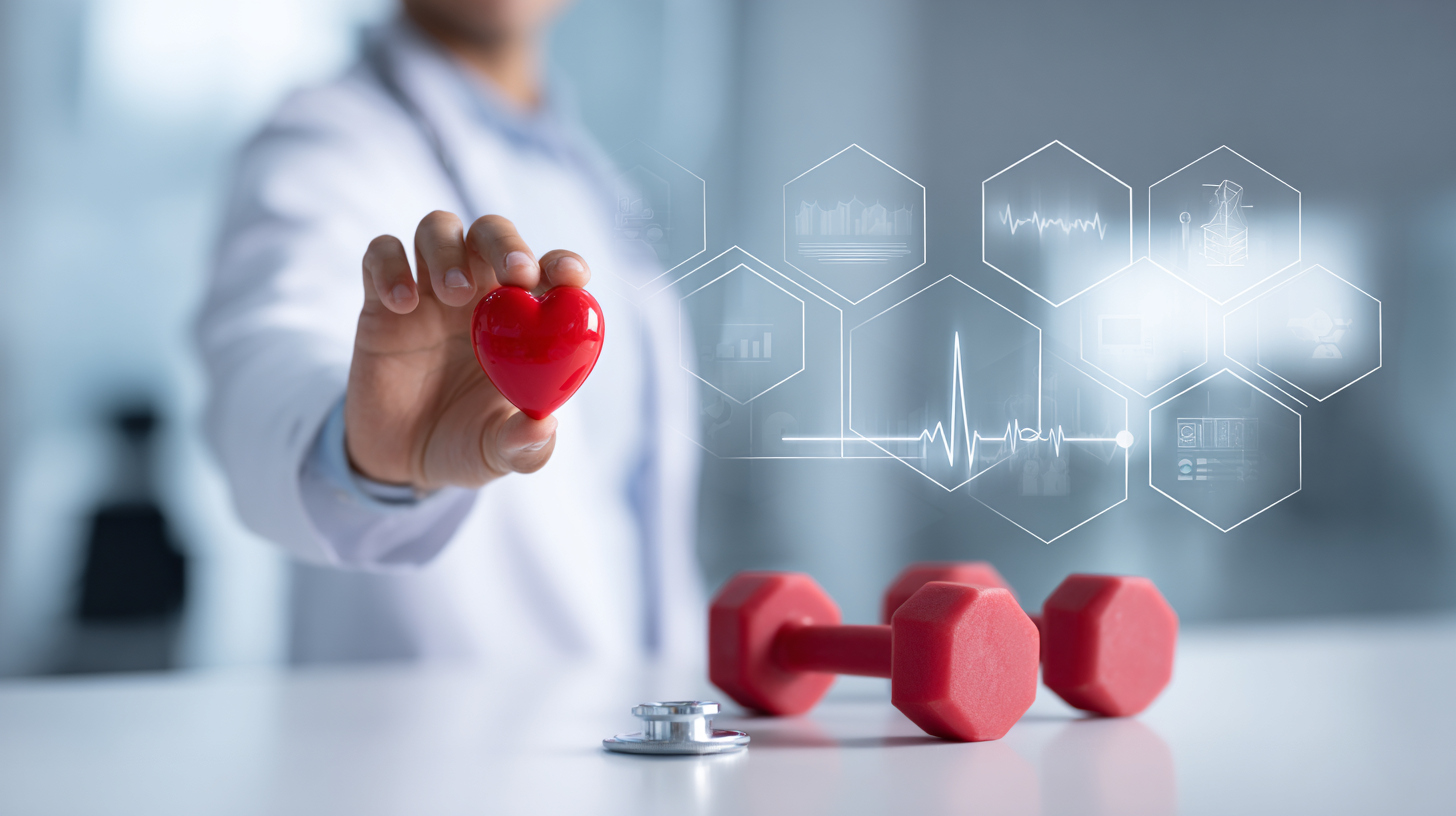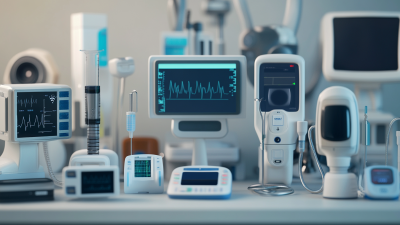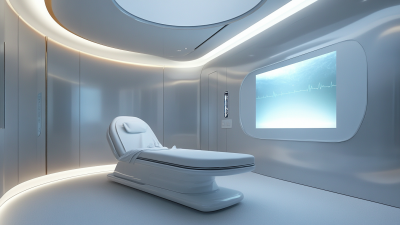Unlocking the Advantages of Health Monitoring Devices for Enhanced Wellbeing
In recent years, the landscape of personal healthcare has been transformed by the advent of Health Monitoring Devices, which have emerged as vital tools for promoting enhanced wellbeing. According to a report by the Consumer Technology Association, the health and wellness technology market is projected to reach $410 billion by 2025, driven largely by the increasing adoption of these innovative devices. Whether through wearable fitness trackers, smartwatches, or remote monitoring systems, these devices empower individuals to take proactive control of their health by providing real-time data on vital signs and activity levels. A study published by the Journal of Medical Internet Research suggests that consistent use of health monitoring technology can lead to significant improvements in health outcomes, including reduced hospital admissions and increased engagement in preventive care.

As we delve into the various advantages of Health Monitoring Devices, it becomes clear that they are not just gadgets, but essential partners in the journey towards a healthier life.
Understanding Health Monitoring Devices: Types and Technologies
Health monitoring devices have become essential tools in modern healthcare, offering various technologies tailored to different needs. These devices encompass a range of categories, including wearable fitness trackers, smartwatches, and portable medical devices. According to a report by Grand View Research, the global wearable medical device market is expected to reach $27.8 billion by 2026, emphasizing the growing acceptance of these technologies among consumers. Wearables not only track physical activity but also monitor vital signs such as heart rate, blood oxygen levels, and even glucose levels, leading to proactive health management.

Emerging technologies, like telemedicine integrations and AI-powered analytics, are enhancing the functionality of health monitoring devices. For instance, a study by the Consumer Technology Association indicates that 77% of users believe these devices help them take timely action regarding their health. Furthermore, the integration of IoT capabilities has improved data sharing between devices and healthcare providers, fostering personalized care. As these technologies continue to evolve, the potential for improved health outcomes and enhanced patient engagement is significant, highlighting the importance of staying informed about the latest advancements in this dynamic field.
Key Benefits of Health Monitoring: Why You Should Start Using Them
Health monitoring devices have revolutionized the way we approach personal wellness, leading to significant improvements in health outcomes. According to a report from the Global Wellness Institute, the global wellness technology market is expected to reach USD 74 billion by 2026. This surge in adoption is primarily driven by the growing awareness of preventive healthcare. By keeping track of critical metrics such as heart rate, blood pressure, and activity levels, individuals can gain valuable insights into their health status and potentially catch health issues early.
Moreover, research published in the Journal of Medical Internet Research indicates that health monitoring devices can lead to a 20% increase in health management effectiveness among users. These devices not only empower individuals to make informed lifestyle choices but also foster engagement with healthcare providers. For instance, wearable technology has proven to enhance medication adherence by up to 50%, as users receive timely reminders and alerts. In an era where personalized medicine is becoming more prominent, integrating health monitoring devices into daily routines can truly enhance well-being and support long-term health management strategies.
Unlocking the Advantages of Health Monitoring Devices for Enhanced Wellbeing
This chart illustrates the key benefits of health monitoring devices based on user feedback. The data shows the percentage of users who reported improvements in various aspects of their health after using these devices.
How to Choose the Right Health Monitoring Device for Your Needs
Choosing the right health monitoring device can significantly enhance your overall wellbeing.
With the increasing demand for personal health management, the global market for health monitoring devices is projected to reach
$37 billion by 2025, as reported by industry analysts.
The array of options available can be overwhelming, but understanding your specific needs is crucial.
For instance, if you're focused on fitness tracking, devices like smartwatches with heart rate monitors and GPS can provide
real-time data to help you optimize your workouts. Conversely, if chronic conditions are a concern, glucose monitors or blood
pressure cuffs may be more appropriate.
Tip: Before making a purchase, consider what health metrics
are most important to you. This could be anything from heart rate variability to sleep quality. Look for devices that not
only track these metrics but also offer comprehensive data analysis to help you interpret the information effectively.
Moreover, factors such as compatibility with your smartphone, battery life, and user-friendly interfaces should also influence
your decision. According to research from the Pew Research Center, 70% of
Americans track at least one health indicator, emphasizing the growing interest in health monitoring. Choose a device that's
equipped with features that align with your lifestyle to ensure you remain engaged in your health journey.
Tip: Don't forget to read user reviews and check for updates,
as many devices improve functionality over time through firmware upgrades. Selecting the right health monitoring device tailored
to your individual needs can lead to better management of your health and wellbeing.
Integrating Health Data: Making Sense of Your Monitoring Results
Health monitoring devices have revolutionized the way we manage our wellbeing by providing real-time insights into our health metrics. The integration of diverse health data, including psychological information and physical health parameters, offers a more comprehensive understanding of an individual’s condition. Recent studies have shown that incorporating mental health data into predictive models significantly enhances cardiovascular disease (CVD) prediction accuracy. This highlights the importance of merging different types of health data to create a more holistic picture of health, which can lead to better patient outcomes.
Moreover, with advancements in artificial intelligence and machine learning, the interpretation of health monitoring results becomes increasingly sophisticated. Automated systems can analyze vast amounts of data from remote patient monitoring tools, identifying trends and potential health risks that may go unnoticed in traditional healthcare settings. The role of technology extends to predicting future health issues, enabling proactive measures that enhance overall wellbeing. By grasping the nuances in our health data, individuals and healthcare providers alike can make informed decisions that lead to a more personalized approach to health management.
Unlocking the Advantages of Health Monitoring Devices for Enhanced Wellbeing - Integrating Health Data: Making Sense of Your Monitoring Results
| Device Type | Key Features | User Demographics | Health Benefits | Data Utilization |
|---|---|---|---|---|
| Fitness Tracker | Heart Rate Monitoring, Step Counting, Sleep Tracking | Ages 18-45, Fitness Enthusiasts | Improved Physical Activity, Enhanced Sleep Quality | Setting Fitness Goals, Activity Tracking |
| Smart Blood Pressure Monitor | Wireless Connectivity, Irregular Heartbeat Detection | Ages 30+, Individuals with Hypertension | Better Blood Pressure Management, Early Detection of Issues | Tracking Long-term Trends, Automatic Data Sharing with Healthcare Providers |
| Smart Glucose Monitor | Real-time Blood Sugar Monitoring, Alerts for Abnormal Levels | Ages 18+, Diabetic Patients | Improved Blood Sugar Control, Reduced Risk of Complications | Data Analysis for Dietary and Lifestyle Adjustments |
| Wearable ECG Monitor | Heart Rhythm Analysis, Portable Design | Ages 40+, Cardiovascular Patients | Early Detection of Atrial Fibrillation, Increased Patient Awareness | Integration with Health Apps for Comprehensive Reporting |
Future Trends in Health Monitoring Technology for Enhanced Wellbeing
The wearable technology market is experiencing rapid growth, with projections suggesting an increase from $208.78 billion in 2025 to $1.6954 trillion by 2032, reflecting a remarkable compound annual growth rate (CAGR) of 34.9%. As health monitoring devices advance, their integration into daily life is set to enhance individual wellbeing. From fitness trackers to advanced health analytics, these gadgets are not merely accessories but essential tools for proactive health management.
**Tips for Maximizing Health Monitoring Devices:**
1. **Set Realistic Goals:** Utilize your devices to set achievable health targets, whether it be daily steps, heart rate monitoring, or sleep tracking. This helps to maintain motivation and makes progress easier to measure.
2. **Regularly Analyze Data:** Take the time to review the data collected by your wearable device regularly. Understanding trends in your health can provide insights into what lifestyle changes may be necessary to achieve your goals.
3. **Stay Updated on Innovations:** Keep an eye on emerging technologies in health monitoring. As AI and other innovations evolve, they may introduce new features and capabilities that could further enhance your health management strategy.
These trends signify a future where health monitoring technology not only becomes more accessible but also increasingly sophisticated, catering to the diverse needs of individuals seeking to improve their health and lifestyle.

Related Posts
-

Resilient Growth of Chinese Medical Monitoring Devices Amidst US China Tariff Challenges
-

Leading the World in Health Monitoring Innovations from China's Premier Factories
-

Ultimate Guide to Choosing the Best Medical Monitoring Devices for Your Needs
-

Unlocking Cost Savings: How Global Procurement of Surgical Supplies Can Transform Healthcare Efficiency
-

Future Innovations in Medical Device Development and Strategies for Global Buyers
-

Chinese Excellence in Health Equipment Manufacturing for Global Leaders
